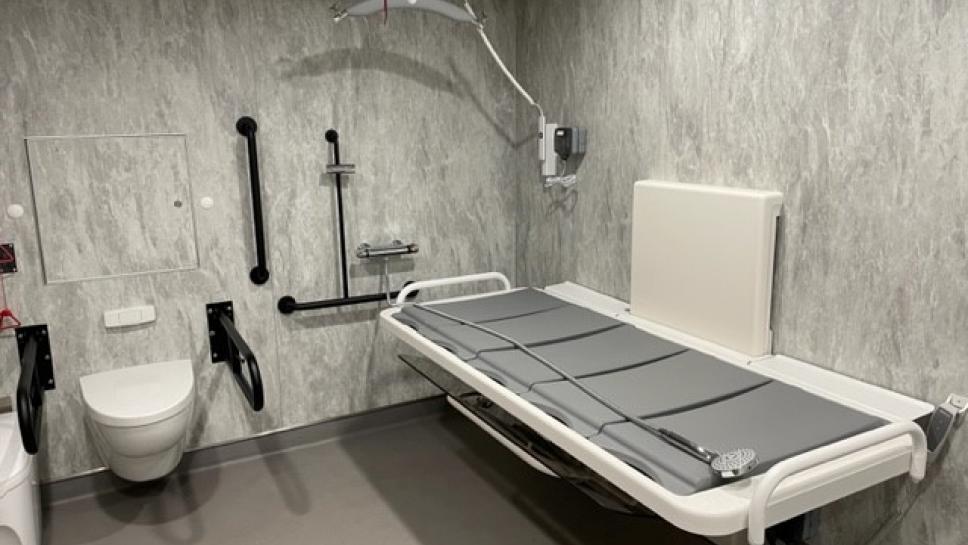
- Over a quarter of a million people in the UK in need of such facilities
- Almost 2,000 Changing Places toilets currently available in the UK – with more needed
- Changing Places Awareness Day highlights the need for more fully accessible toilets
Today (Wednesday 19 July) is Changing Places Awareness Day – the annual event highlighting the importance of fully-accessible toilets needed by more than a quarter of a million people in the UK.
Muscular Dystrophy UK, the co-chair for the Changing Places Consortium, is calling for more Changing Places toilets to be made available. The charity supports more than 110,000 people in the UK living with one of over 60 muscle-wasting and weakening conditions. They campaign for people’s rights, better understanding, accessibility, access to treatments, fund ground-breaking research and provide advocacy support for the muscle-wasting community.
A Changing Places toilet is different to a standard accessible toilet. With extra space (12 sqm) to help accommodate larger wheelchairs and the presence of carers to assist and support the users. It has specialist equipment such as an adult size changing bench ceiling track and hoist, peninsular toilet, and height adjustable sink.
People with profound and multiple learning disabilities, hidden or physical disabilities such as spinal injuries, muscular dystrophy, and multiple sclerosis, often need extra equipment and space to allow them to use the toilets safely and comfortably.
Without enough Changing Places toilets, people with hidden and physical disabilities face the option of not leaving their homes, limiting fluid intake on days out, or having to be changed on dirty toilet floors.
Currently, there are almost 2,000 Changing Places facilities that have been installed and the Changing Places Consortium works with a range of companies, providers venues and government departments.
Changing Places Awareness Day is not only an opportunity to call for more toilets but a day to mark the official launch of the campaign, started back in July 2006. Plus, it’s a chance to celebrate all the achievements to date and thank the dedicated campaigners, who fight for change.
Rob Burley, Director of Campaigns, Care & Support at Muscular Dystrophy UK said: “For some of the people we support, standard accessible toilets can’t meet their needs, which is why we are proud to be the co-chair of the Changing Places Consortium.
“A person living with a muscle-wasting or weakening condition might be in a large powered wheelchair and so may need extra space to manoeuvre around the toilet. They may also need assistance from a family member or a carer and require some of the specialist equipment that is provided in a Changing Places toilet, such as a ceiling hoist and height adjustable sink. We hear from a lot of people saying that without a Changing Places toilet they have had to risk their health and safety and that their dignity has been impacted by having to be changed on a toilet floor, rather than having access to hoists and adult changing benches.”
Karen Hoe, Changing Places Manager at Muscular Dystrophy UK said: “Currently there are almost 2,000 registered Changing Places toilets but there is a need for more, so we’re calling to have them in all appropriate venues. Legislation calls for them to be mandatory in new buildings over a certain capacity, but given the difference these facilities make, we encourage all venues to install a Changing Places toilet, regardless of size, as it will make a huge difference.”
Kerry Thompson, from Milton Keynes, was diagnosed with a form of muscular dystrophy (FHL1) and regularly uses Changing Places toilets. She explains why they are so important to her day-to-day life: “Taking a simple trip out can be a military operation. I have a check list of things to take, especially if it's more than a few hours. The biggest problem I face when going anywhere is using a disabled toilet. I find some are simply too small to fit me, my wheelchair in, and it can sometimes feel very claustrophobic, manoeuvring can also be tricky or near impossible. My only option is sometimes having to wait until I get home. However, I suffer with Irritable Bowel Syndrome (IBS), so holding it can prove really challenging.
“When I found out about the Changing Places campaign, I wanted to get involved and help spread the word on how important these facilities are to so many people, like me, and their families and carers. It makes such a huge difference."
In a reflection of the importance of Changing Places toilets, and the campaign, Changing Places has recently been shortlisted for a National Diversity Award – Community Organisation Award for Disability.
For further information on Changing Places please visit changing-places.org
